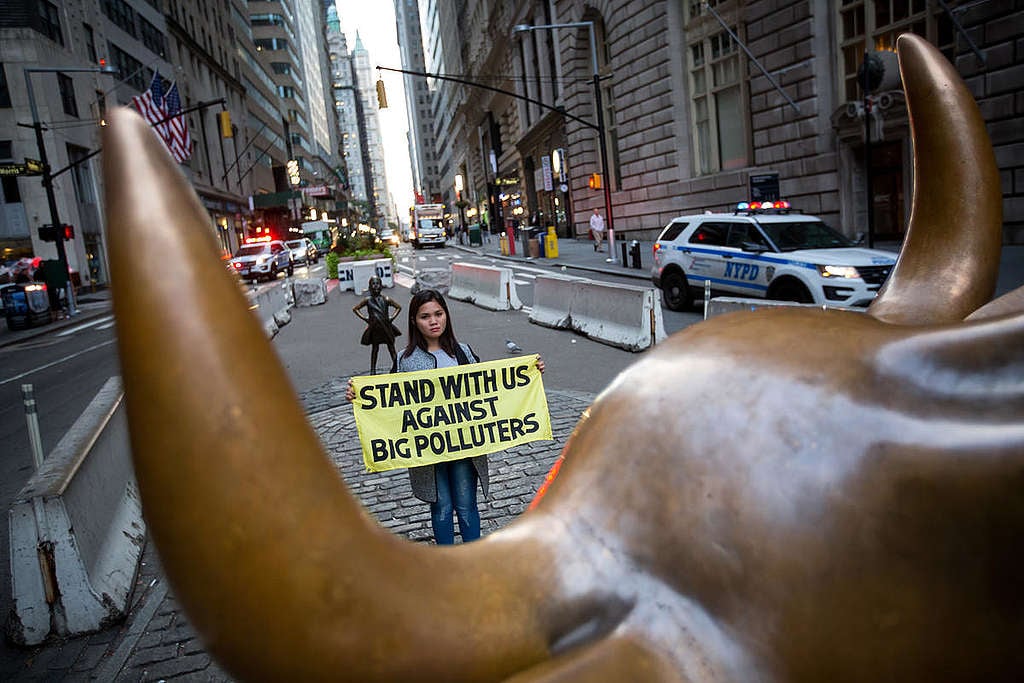Greenpeace calls on PH gov’t to hold big polluters accountable
AUGUST 9, 2021 – Written by the world’s top climate scientists, the Intergovernmental Panel on Climate Change (IPCC) Working Group 1 report on the Physical Science Basis, forming a part of the Sixth Assessment Report, summarizes the latest scientific understanding of what’s happening to the climate system, and gives a stark warning of where we are headed if urgent action isn’t taken.

Kaisa Kosonen, Senior Political Advisor, Greenpeace Nordic said:
“While governments crawl towards curbing emissions, inch-by-inch, the climate crisis is right now claiming whole communities with wildfires, extreme flooding, and drought. The race is on, and the IPCC has just further strengthened the connection between carbon emissions and worsening climate extremes, which means that if governments don’t dig deeper than their currently weak 2030 emission-cutting targets, humanity could lose.
“We’re not going to let this report be shelved by further inaction. Instead, we’ll be taking it with us to the courts. By strengthening the scientific evidence between human emissions and extreme weather the IPCC has provided new, powerful means for everyone everywhere to hold the fossil fuel industry and governments directly responsible for the climate emergency. One only needs to look at the recent court victory secured by NGOs against Shell to realise how powerful IPCC science can be.
“This is a decisive moment for humanity so we need to act like it. Extreme weather events fuelled by carbon pollution are fiercer than ever before, but at the same time we’re making breakthroughs with solutions. With solar and wind now the cheapest way to produce new power in the majority of the world, mobility freed from oil, and finance dwindling for coal, a world free of fossil fuels is becoming possible. This is the moment to rise up, be bold and think big. We all need to accelerate the green transition while ensuring justice and protection for local communities and people paying the highest cost for climate inaction.”
Yeb Saño, Executive Director, Greenpeace Southeast Asia, said:
“The report details the science of what we already know from experience about the changing climate system and the consequent devastation, especially for those communities and sectors that are most vulnerable and at the frontline of impacts. It also shows us that, unless world leaders make their commitments as strong as the science requires, we will continue to experience increasing extreme weather events and every year will be record-breaking for unprecedented storms, rainfall, heatwaves, droughts, flooding and worsening conditions, such as we are experiencing now. We now see that these are affecting all of us, but frontline communities, especially in places like those in Southeast Asia, will experience more and more climate injustice if we don’t hold up to the Paris Agreement of limiting warming to 1.5°C. As the youth of today clamors: let us unite behind the science.”
Khevin Yu, Energy Transition Campaigner, Greenpeace Philippines, said:
“The looming impacts of the climate crisis to our communities should compel governments to realign their climate commitments and ensure that climate justice is at the core of climate action. In the Philippines, our government should not be content with endless negotiations. Instead, the government must act with urgency to facilitate the Philippines’ just transition to a low-carbon and fossil fuel-free society. We urge the Duterte administration to 1) increase the ambition in the NDCs, 2) ensure the Congress’ Climate Emergency Declaration is followed through with a coherent national strategy to address the climate crisis, and 3) hold fossil fuel companies accountable for their share of responsibility for the climate crisis.”
The scientific consensus presented in the report adds pressure on the discussions on how to accelerate countries’ action in line with the Paris Agreement 1.5°C warming limit – with new and revised 2030 commitments expected from leaders at the UN climate conference (COP26) in Glasgow, Scotland in November 2021.
The report does not address the impacts of climate change to humans, nor the ways to mitigate climate change and its impacts, as those are topics that will be covered by the remaining three parts of the IPCC 6th Assessment Report, due to be finalised and published next year.
Greenpeace was an official observer to the IPCC and attended the virtual approval meeting of the WG1 report. Experts are available for comment.
Brief: Greenpeace Key takeaways from the IPCC report on Physical Science Basis (AR6 WG1)
Notes to editors:
[1] The Philippines awaits the final resolution to the world’s Climate Change and Human Rights Inquiry filed in 2015 by a group of Filipino civil society organizations, community members, activists, and typhoon survivors seeking to hold carbon majors, such as Shell, Total, Exxon, BP, and Chevron, accountable to the human rights harms brought by climate crisis.
[2] While the current NDC draft has increased the overall GHG emissions reduction target to 75% from 2020 to 2030, the country’s unconditional target only increased from 2% to 2.71%. DOE, which oversees the most carbon-intensive sector, has only committed a 2.8% reduction and avoidance target from 2020 to 2030 and 12.3% from 2020 to 2040.
Media contact:
Angeli Cantillana
Communications Campaigner, Greenpeace Southeast Asia – Philippines
[email protected] | +63 998 595 9733

Filipinos are enduring the worst impacts of climate change, caused by greedy corporations. It’s time to hold them to account!
